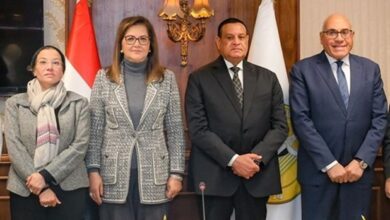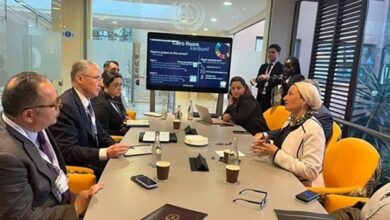The forthcoming period is an extremely sensitive and crucial one when it comes to Egypt's environmental issues. Since the previous government considered it a burden to respond to even basic human needs, the environment was obviously not made a priority.
Despite hopes for a brighter environmental future, Prime Minister Essam Sharaf has maintained Maged George as environmental minister. George epitomizes the total environmental degradation in Egypt, producing the worst environmental results in its history. There is no better way to continue destroying Egypt's environment than by keeping George, an ex-military officer who joined the cabinet during Mubarak’s reign, in his position.
The environment continues to be neglected here, despite the country's enormous levels of air pollution, garbage, waste and noise, as well as its difficulty with utilizing natural resources efficiently.
Prior to the 25 January revolution, the minister of environmental affairs’ position remained a gift of patronage, just like many other key positions at the ministry. The current minister, Maged George, is the best example of this – he is a man whose only qualification for the position was a prominent military background. In addition, his entire team came from different military domains before joining the Environment Ministry at the end their careers.
The likelihood that such an organizational structure can continue to properly function is difficult to imagine.
In fact, the environmental parameters produced by the ministry, known as the Egyptian Environmental Affairs Agency (EEAA), reflect a very encouraging situation in Egypt at a time when all the sensors should be ringing the alarm. This in itself reflects the poor quality of the ministry's reports.
The so-called protection agency is skilled at digesting donor money with no obvious positive impact on the daily lives of citizens. It is also worth mentioning that the EEAA doesn’t have the financial capacity to work independently, as it relies on its donor money.
Creativity in researching environmental issues is conspicuously absent; the EEAA has always been eager to start bilateral cooperation with external parties, but it has never shown any interest in investing in environmental development and sustainability.
The EEAA also fails in effectiveness when it comes to implementation and enforcement. They literally have no say on other ministries and cannot even set performance benchmarks allowing them to halt the operations of another facility in if it is committing emission violations.
The agency is better categorized as an “environmental burden,” both to Egypt and its cabinet. One visit to any of its departments will reveal the department's level of inefficiency, revealed in its unsustainable consumption of paper, water and ink, as well as its generally poor employee performances.
Inefficiency is of course very common in many other governmental establishments, yet having the problem in the only environmentally-concerned entity is beyond ironic.
The EEAA not only suffers from incompetent leadership and a minister devoid of an environmental background, but staff recruitment is also a horribly mismanaged process. This generally leads to retired military generals managing units and lead projects. As one might expect, military operation and environmental protection are two disciplines that could not be further away from each other.
In Egypt, there are very few recognized educational institutes that have environmental programs, which makes it hard for graduate candidates to work in the country. This education loophole results in the hiring of unskilled staff, who are more concerned with job security than the environment.
Considering all of the above problems with Egypt's environmental protection, we should now try to discover how to pave the way for a more sustainable future. To do so, the EEAA must be utterly be revamped, integrating into Egypt's political transition. It must accomplish the following tasks before it can finally become an efficient entity.
As for finances, the EEAA, like any other ministry, might have its own budget, but adding sustainability requirements must be aided by tax income to ensure the ongoing process of development. These taxes will also enable the EEAA to reach financial independence from both the Egyptian government and its donors, allowing it to decide on its activities freely and to be able to act independently against polluters.
The EEAA should also improve its management and internal structure. Most of the world's environmental ministries can easily implement decentralization, as decision-making is based on scientific evidence and not influenced by a political agenda. Decisions are taken on the basis of environmental indicators that push policy and decision making in a direction that doesn’t threaten and harm the environment. The Environment Ministry should become totally independent and decide of its priorities, and it should reach financial independence in order to have the power to challenge the interests of polluters. It should be capable of pursuing those who break the law without reservations and attack unscrupulous investors. Also, a different caliber of employees should become the ministry’s staff, and young people should be regularly added to the team to maintain dynamism within the ministry. Also, it is necessary to avoid employees with a military background whose priorities differ too much from the environmentalists.
As for marketing and communication, when was the last time you saw an advertisement about an environmental issue on the streets of Cairo, convincing you of the seriousness of this cause? The EEAA is sorely lacking in this vital capacity, as well as the ability to promote environmental awareness, which has sadly become the sole responsibility of NGOs in Egypt.
The EEAA has no obvious commitment to technology and innovation in any field, with no clear commitment in particular to green technology and innovation. The EEAA building is anything but eco-friendly. The EEAA also does not promote technologies that conserve natural resources and help environmental protection. Egypt has only received four Clean Development Mechanism (CDM) investments, which in so few words explains the sorry history of the EEAA.
A CDM is a financial mechanism provided by the United Nations Framework Convention on Climate Change, in which wealthy countries will finance environmental development projects if the money required will result in a positive ecological impact. Most of these CDMs are related to fuel-switching projects and renewable energy.
Further, education remains the strongest weapon against environmental ignorance. If school children and university students begin receiving an environmentally conscious education, the ecological situation of Egypt will undoubtedly get much better. The EEAA has totally ignored the educational component of protecting the environment, and as a result there are very few environmentally-concerned educational entities in Egypt.
The EEAA should use a cross-cutting approach to enforcing regulations. The agency has been inefficient when enforcing environmental regulations with other government establishments and ministries. It has also failed to convince the government to become more sensitive to its environmental footprint. Some examples of this waste include the country's transportation fleet, the volume of paper consumed at local schools and universities, and terrible industrial waste management at the municipal level. The EEAA must become more effective when dealing with other government entities.
Waleed Mahmoud Mansour is a program specialist at the Regional Centre for Disaster Risk Reduction in Cairo, Egypt.




